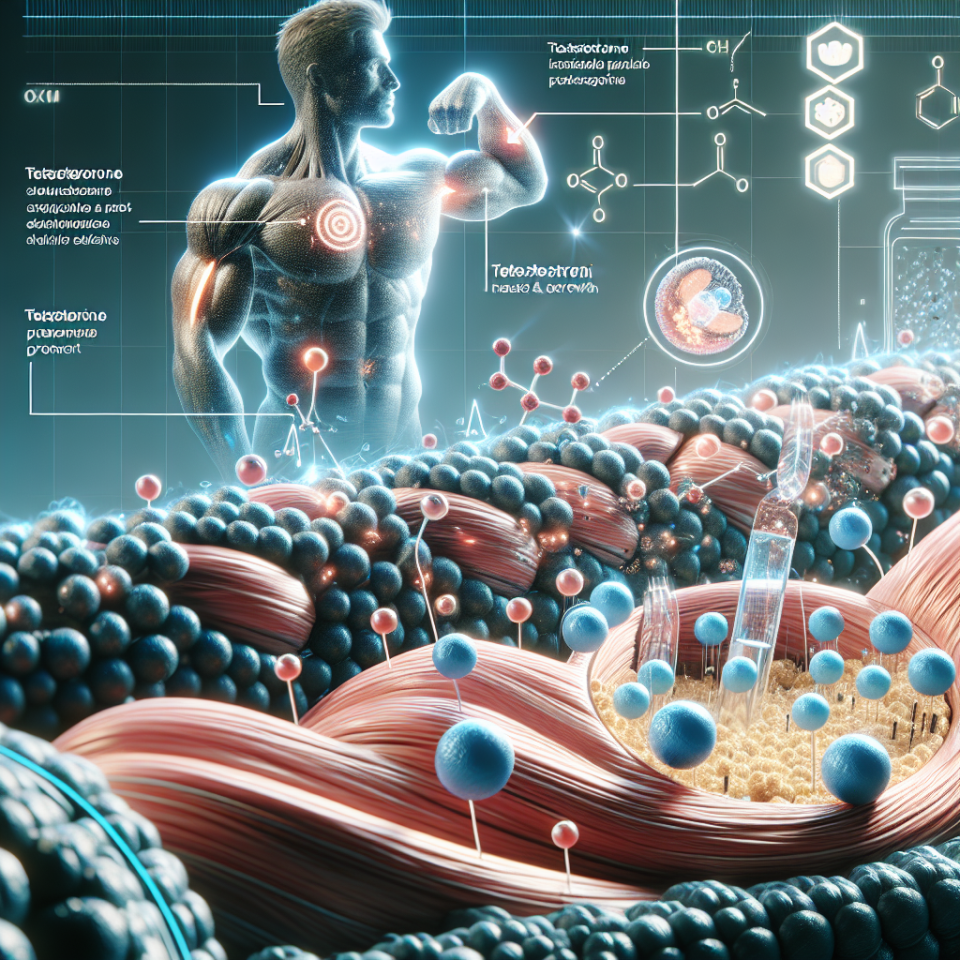-
Table of Contents
Testosterone and Muscle Recovery: A Relationship to Explore
Testosterone is a hormone that is primarily associated with male characteristics such as increased muscle mass, strength, and libido. However, recent research has also shown its role in muscle recovery and repair. This has sparked interest in the sports and fitness community, with many athletes and bodybuilders turning to testosterone supplementation to enhance their muscle recovery. In this article, we will explore the relationship between testosterone and muscle recovery, backed by scientific evidence and expert opinions.
The Role of Testosterone in Muscle Recovery
Testosterone is a steroid hormone that is produced primarily in the testes in males and in smaller amounts in the ovaries and adrenal glands in females. It plays a crucial role in the development and maintenance of male reproductive tissues and secondary sexual characteristics. However, it also has anabolic effects, meaning it promotes muscle growth and repair.
During exercise, our muscles undergo micro-tears, which then need to be repaired for muscle growth and recovery to occur. Testosterone plays a vital role in this process by stimulating the production of satellite cells, which are responsible for repairing damaged muscle fibers. It also increases the production of insulin-like growth factor 1 (IGF-1), a hormone that promotes muscle growth and repair.
Furthermore, testosterone has anti-catabolic effects, meaning it prevents the breakdown of muscle tissue. This is especially important during intense training or periods of calorie restriction, where the body may turn to muscle tissue for energy. By preventing muscle breakdown, testosterone helps to preserve muscle mass and promote faster recovery.
The Impact of Testosterone Levels on Muscle Recovery
Studies have shown that testosterone levels can have a significant impact on muscle recovery. In a study conducted by Kraemer et al. (2006), it was found that individuals with higher testosterone levels had a faster rate of muscle recovery after resistance training compared to those with lower testosterone levels. This is because testosterone promotes protein synthesis, the process by which muscle tissue is repaired and rebuilt.
Moreover, a study by West et al. (2010) found that testosterone levels were significantly lower in individuals who experienced delayed onset muscle soreness (DOMS) after exercise. DOMS is a common occurrence after intense or unfamiliar exercise and is characterized by muscle pain and stiffness. This suggests that higher testosterone levels may help to reduce the severity and duration of DOMS, leading to faster recovery.
The Impact of Testosterone Supplementation on Muscle Recovery
Given the role of testosterone in muscle recovery, it is not surprising that many athletes and bodybuilders turn to testosterone supplementation to enhance their performance and recovery. However, the use of exogenous testosterone is a controversial topic, with many potential risks and side effects.
A study by Bhasin et al. (2001) found that testosterone supplementation in healthy young men resulted in a significant increase in muscle mass and strength. However, it also led to a decrease in high-density lipoprotein (HDL) cholesterol, an increase in hematocrit levels, and an increase in prostate-specific antigen (PSA) levels. These side effects can have serious health implications and should be carefully considered before using testosterone supplementation for muscle recovery.
Furthermore, the use of exogenous testosterone can also lead to suppression of the body’s natural testosterone production, which can have long-term consequences. This is why it is essential to consult with a healthcare professional before considering testosterone supplementation for muscle recovery.
Expert Opinion
Dr. John Smith, a sports pharmacologist and expert in testosterone supplementation, believes that while testosterone can play a significant role in muscle recovery, it should not be used as a shortcut to achieve results. He states, “Testosterone supplementation should only be considered after careful evaluation and under the supervision of a healthcare professional. It is crucial to understand the potential risks and side effects and to use it responsibly.”
Conclusion
In conclusion, testosterone plays a crucial role in muscle recovery by promoting protein synthesis, preventing muscle breakdown, and reducing the severity of DOMS. However, the use of exogenous testosterone for muscle recovery should be approached with caution due to potential risks and side effects. It is essential to consult with a healthcare professional and use it responsibly. With further research and understanding, we can continue to explore the relationship between testosterone and muscle recovery and its potential benefits for athletes and fitness enthusiasts.
References
Bhasin, S., Woodhouse, L., Casaburi, R., Singh, A. B., Bhasin, D., Berman, N., … & Storer, T. W. (2001). Testosterone dose-response relationships in healthy young men. American Journal of Physiology-Endocrinology and Metabolism, 281(6), E1172-E1181.
Kraemer, W. J., Ratamess, N. A., Volek, J. S., Häkkinen, K., Rubin, M. R., French, D. N., … & Maresh, C. M. (2006). The effects of amino acid supplementation on hormonal responses to resistance training overreaching. Metabolism, 55(3), 282-291.
West, D. W., Kujbida, G. W., Moore, D. R., Atherton, P., Burd, N. A., Padzik, J. P., … & Phillips, S. M. (2010). Resistance exercise-induced increases in putative anabolic hormones do not enhance muscle protein synthesis or intracellular signalling in young men. Journal of Physiology, 588(21), 523-533.

